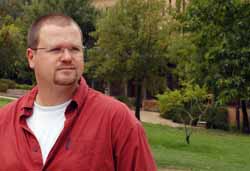The stoic pioneer and the sporting hero are all images celebrated at some point in our history as uniquely Australian rural identities. A new book by Charles Sturt University (CSU) academics aims to broaden the debate about rural identity.
“With its main campuses spread across regional NSW and its staff living and working in rural Australia, we believe Charles Sturt University is well positioned to ponder the notions of regional and rural identities,” the book’s co-editor Dr Troy Whitford said.
Ten academics based in the School of Humanities and Social Sciences at CSU have done just that by contributing to the new book, Where the Crows Fly Backwards: Notions of Rural Identity.
 “It is quite special that academics from the one School have drawn on their wide-ranging expertise in art, literature, history, politics, sociology, social work and psychology to contribute to the debate on rural identity,” Dr Whitford said.
“It is quite special that academics from the one School have drawn on their wide-ranging expertise in art, literature, history, politics, sociology, social work and psychology to contribute to the debate on rural identity,” Dr Whitford said.Where the Crows Fly Backwards: Notions of Rural Identity will be launched by the CSU Deputy Vice-Chancellor (Academic) Professor Ross Chambers at 4.30pm on Monday 26 July at CSU in Wagga Wagga.
The book’s contributors from the School of Humanities and Social Sciences at CSU are:
- Associate Professor Wendy Bowles. Her article examines rural identity and life in ‘the bush’ through conversations with residents of the NSW town of West Wyalong.
- Dr Ingrid Muenstermann whose chapter focuses on the future role of women in farming.
- Dr Bill Anscombe. He examines Indigenous overrepresentation in crime and punishment.
- Dr Morgan Luck who examines the idea that rural people may be more likely to acknowledge their religious beliefs. He looks further into a fear of nature in shaping religious belief.
- Dr Nicole Anae. She looks at rural identity through international opera star Fannie Simonsen’s performance in Wagga Wagga in 1866.
- Dr Therese Taylor who draws on the 2005 horror film Wolf Creek for her chapter and explores the significance of the landscape of the Australian outback.
- Professor Carmen Moran who examines the power of cartoon images in regional and Australian identity.
- Dr Max Staples outlines how photographic images of Far North Queensland have helped overcome distance in attracting people to the area.
- Dr Troy Whitford uses a study of populist rural political candidates to show the traits that resonate with the ideas and values of bush electorates.
- Dr Angela Ragusa examines the uniquely Australian cultural phenomenon of ‘tree-change’, considering motivations of metropolitan people moving to rural areas.





Social
Explore the world of social